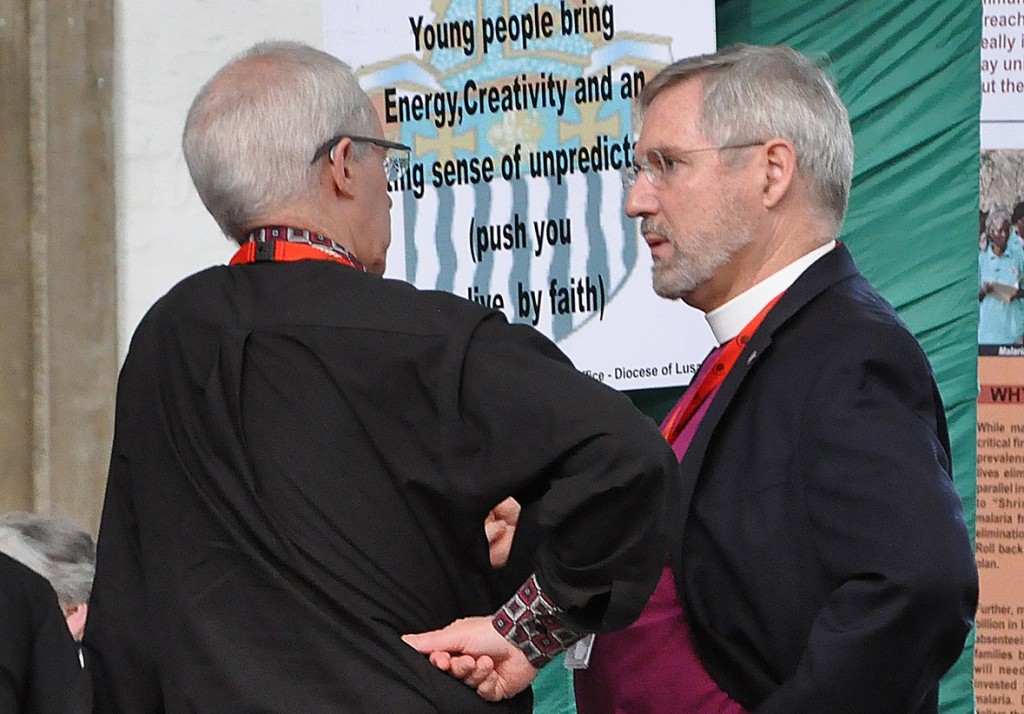As reported yesterday, the Anglican Consultative Council passed this resolution on April 18:
The Anglican Consultative Council
- receives the formal report of the Archbishop of Canterbury to ACC-16 on the Primates’ Gathering and Meeting of January 2016; and
- affirms the commitment of the Primates of the Anglican Communion to walk together; and
- commits to continue to seek appropriate ways for the provinces of the Anglican Communion to walk together with each other and with the Primates and other Instruments of Communion.
That’s too much for a headline. ACNS boils it down to “ACC commits to ‘walking together’ with the Primates” in this report dated April 20:
The Archbishop briefed members of the ACC last week about the Primates’ meeting; and this week they unanimously agreed a resolution backing the Primates’ decisions.
Speaking to ACNS last night, as he prepared to fly out of Lusaka at the end of the ACC-16 meeting, Archbishop Welby welcomed the resolution. “The actions of the ACC demonstrate that it is working in close collaboration with the Primates, as has been the aim since both started and is set out especially in Resolution 52 of the Lambeth Conference 1988,” Archbishop Welby said.
“Given that my report, referred to in the resolution, incorporated the Communiqué and was very explicit on consequences; the resolution clearly supports and accepts all the Primates’ Meeting conclusions.
“No member of the Episcopal Church stood for office in the ACC or Standing Committee. The consequences of the Primates meeting have been fully implemented.”
The ACNS report refers back to Welby’s report that he references above in his interpretation of the meaning of the resolution:
In his report to the ACC last week, during their meeting at the Cathedral of the Holy Cross in Lusaka, Archbishop Welby said: “Like all the Instruments of Communion – whether the ACC, the [office of the] Archbishop of Canterbury, or the Lambeth Conference – the Primates’ meeting has no legal authority over Provinces. Any kind of synodical control of that kind has been rejected since the first Lambeth Conference.
“Neither can any one instrument legally bind another Instrument. The Anglican Communion only works when the relationships within it are good enough to permit a common discernment of the way in which we are being led by the Spirit. And historically this has been seen in what is often called reception.
“Both before, but especially since Lambeth 1920, one of the great Lambeth conferences, reception has meant the informal process of relationships, by which, over time, developments in the life of the Communion are accepted or rejected in a way that leads to consensus. Thus, issues in 1920 around contraception, in Lambeth 1930 and 1948 around divorce were at the time seen as threatening the unity of the Communion.
“We have been here before. And they were seen as as much of a serious difficulty as issues of sexuality today….
Is Welby equating “receiving” and “reception of” a report of a gathering/meeting?
A resolution to “welcome” his report and pursue further consequences was withdrawn.
In the list of resolutions of ACC-16 the term “receives” is frequently used, often as “receives and commends.” The use of “welcomes” is less frequent.
Yesterday ENS posted A Letter from Lusaka: Episcopal Church’s ACC members write to the church. An excerpt:
Because this ACC meeting was held in the shadow of the January Primates Gathering and Meeting that sought to restrict our participation as members from The Episcopal Church, we want to assure you that we participated fully in this meeting and that we were warmly welcomed and included by other ACC members. Archbishop of Canterbury Justin Welby did report to the ACC on the Primates Gathering and Meeting [see here] on the first day of the meeting. Beyond that report, ACC members seemed to have little energy for answering the primates’ call for consequences, for discussing disagreements over human sexuality, or for taking up the call of Anglican Communion Secretary-General Josiah Idowu-Fearon to pursue the Anglican Covenant. Yesterday, in fact, a resolution that sought to pursue further consequences against The Episcopal Church was withdrawn just before it was scheduled for debate.
April 18th ENS had Anglican Consultative Council declines to go along with ‘consequences.
The House of Deputies report on the resolutions provides a sharply different perspective from the ACNS report of Welby’s take. See our post yesterday on that report.
Graham Kings, of the Anglican Communion Office tweets,
'Narratives and counter-narratives: the case of #ACCLusaka' @ZacharyGuiliano @CovenantTLC Perceptive. https://t.co/DG47Whap8B
— Graham Kings (@MissioTheology) April 20, 2016
Jim Naughton, former editor of Episcopal Café, responds:
At some point anti-#episcopal partisanship of @MissioTheology causes problems for @ACOffice, no? Or is bashing member churches OK for staff?
— Jim Naughton (@JimNaught) April 20, 2016
Image of ABC and Ian credit ENS.

